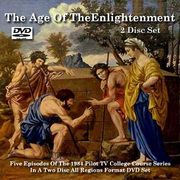The Age Of The Enlightenment TV College Course DVD, Download, USB
21.69
USD. Free Shipping Worldwide!
Six Half-Hour Episodes Of The 1984 Pilot TV College Course Series, Presented In The Highest DVD Quality MPG Video Format Of 9.1 MBPS In An Archival Quality 2 Disc All Regions Format DVD Set, MP4 Video Download Or USB Flash Drive! #TheAgeOfEnlightenment #AgeOfEnlightenment #TheAgeOfTheEnlightenment #AgeOfTheEnlightenment #AgeOfReason #TheEnlightenment #TheAgeOfReason #SmileOfReason #TheSmileOfReason #TVCollegeCourses #History #FrederickII #Voltaire #NobleSavage #Hogarth #WilliamHogarth #Bath #BathSomerset #DVD #VideoDownload #MP4 #USBFlashDrive
Contents:
VOLUME 1
Frederick And Voltaire: The Story Of A (3-Year) Visit, Compiled From Their Letters And Other Writings
The Noble Savage
Freedom And Plenty: England Through Foreign Eyes 1725-50
VOLUME 2
Innocents: Images In Hogarth's Paintings
Bath: A Theatre For Pleasure Or Intrigue
Chardin And The Female Image (Women In Dutch Paintings)
The Age Of Enlightenment, also known as the Age Of Reason or simply The Enlightenment, was an intellectual and philosophical movement that dominated the world of ideas in Europe during the 17th and 18th centuries. The Enlightenment included a range of ideas centered on the pursuit of happiness, sovereignty of reason and the evidence of the senses as the primary sources of knowledge and advanced ideals such as liberty, progress, toleration, fraternity, constitutional government and separation of church and state. The Enlightenment emerged out of a European intellectual and scholarly movement known as Renaissance humanism and was also preceded by the Scientific Revolution and the work of Francis Bacon, among others. Some date the beginning of the Enlightenment to Rene Descartes' 1637 philosophy of Cogito, ergo sum ("I think, therefore I am"), while others cite the publication of Isaac Newton's Principia Mathematica (1687) as the culmination of the Scientific Revolution and the beginning of the Enlightenment. French historians traditionally date its beginning with the death of Louis XIV of France in 1715 until the 1789 outbreak of the French Revolution. Most end it with the beginning of the 19th century. Philosophers and scientists of the period widely circulated their ideas through meetings at scientific academies, Masonic lodges, literary salons, coffeehouses and in printed books, journals, and pamphlets. The ideas of the Enlightenment undermined the authority of the monarchy and the Catholic Church and paved the way for the political revolutions of the 18th and 19th centuries. A variety of 19th-century movements, including liberalism and neoclassicism, trace their intellectual heritage to the Enlightenment. In France, the central doctrines of the Enlightenment philosophers were individual liberty and religious tolerance, in opposition to an absolute monarchy and the fixed dogmas of the Church. The Enlightenment was marked by an emphasis on the scientific method and reductionism, along with increased questioning of religious orthodoxy-an attitude captured by Immanuel Kant's essay Answering the Question: What is Enlightenment, where the phrase Sapere aude (Dare to know) can be found.
Six Half-Hour Episodes Of The 1984 Pilot TV College Course Series, Presented In The Highest DVD Quality MPG Video Format Of 9.1 MBPS In An Archival Quality 2 Disc All Regions Format DVD Set, MP4 Video Download Or USB Flash Drive! #TheAgeOfEnlightenment #AgeOfEnlightenment #TheAgeOfTheEnlightenment #AgeOfTheEnlightenment #AgeOfReason #TheEnlightenment #TheAgeOfReason #SmileOfReason #TheSmileOfReason #TVCollegeCourses #History #FrederickII #Voltaire #NobleSavage #Hogarth #WilliamHogarth #Bath #BathSomerset #DVD #VideoDownload #MP4 #USBFlashDrive
Contents:
VOLUME 1
Frederick And Voltaire: The Story Of A (3-Year) Visit, Compiled From Their Letters And Other Writings
The Noble Savage
Freedom And Plenty: England Through Foreign Eyes 1725-50
VOLUME 2
Innocents: Images In Hogarth's Paintings
Bath: A Theatre For Pleasure Or Intrigue
Chardin And The Female Image (Women In Dutch Paintings)
The Age Of Enlightenment, also known as the Age Of Reason or simply The Enlightenment, was an intellectual and philosophical movement that dominated the world of ideas in Europe during the 17th and 18th centuries. The Enlightenment included a range of ideas centered on the pursuit of happiness, sovereignty of reason and the evidence of the senses as the primary sources of knowledge and advanced ideals such as liberty, progress, toleration, fraternity, constitutional government and separation of church and state. The Enlightenment emerged out of a European intellectual and scholarly movement known as Renaissance humanism and was also preceded by the Scientific Revolution and the work of Francis Bacon, among others. Some date the beginning of the Enlightenment to Rene Descartes' 1637 philosophy of Cogito, ergo sum ("I think, therefore I am"), while others cite the publication of Isaac Newton's Principia Mathematica (1687) as the culmination of the Scientific Revolution and the beginning of the Enlightenment. French historians traditionally date its beginning with the death of Louis XIV of France in 1715 until the 1789 outbreak of the French Revolution. Most end it with the beginning of the 19th century. Philosophers and scientists of the period widely circulated their ideas through meetings at scientific academies, Masonic lodges, literary salons, coffeehouses and in printed books, journals, and pamphlets. The ideas of the Enlightenment undermined the authority of the monarchy and the Catholic Church and paved the way for the political revolutions of the 18th and 19th centuries. A variety of 19th-century movements, including liberalism and neoclassicism, trace their intellectual heritage to the Enlightenment. In France, the central doctrines of the Enlightenment philosophers were individual liberty and religious tolerance, in opposition to an absolute monarchy and the fixed dogmas of the Church. The Enlightenment was marked by an emphasis on the scientific method and reductionism, along with increased questioning of religious orthodoxy-an attitude captured by Immanuel Kant's essay Answering the Question: What is Enlightenment, where the phrase Sapere aude (Dare to know) can be found.
